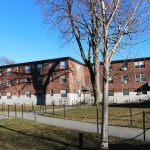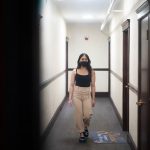
The show must go on, according to faculty and students in the College of Fine Arts’ School of Music, who are taking increased health and safety precautions to keep music alive this semester across remote and in-person classes.
Barbara Raney, manager of student services for the School of Music, said a report sent out last week from CFA Dean Harvey Young showed a majority of students chose to return for in-person learning this Fall.
For those who did, Raney said she has heard positive feedback.
“The more students I speak to, they feel comfortable and confident that they made the right choice to study there in person,” Raney said. “And that feels really good because we did an awful lot of work in the summer preparing for this.”
Students studying remotely attend orchestral classes asynchronously, meaning they watch a recording of the live orchestra rehearsal and then send back a recording of themselves playing their part with the original video, Raney said. The conductor will then review the student’s individual performance.
In early August, School of Music Director Gregory Melchor-Barz emailed a Tech Sheet to students recommending equipment they “should have on hand to support online music-making.” The sheet listed a computer, high-speed internet, ethernet cable, microphone, headphones and music stand.
Students taking in-person classes can attend rehearsal on campus while following public health protocols, such as shortened rehearsals with fewer people and the wearing of masks at all times, Raney said. In addition, students are required to bring their own music stands to prevent potential spread of the virus.
Practice rooms are also available for students to use via a reservation system, Raney said.
Sean Lee, a senior in the School of Music studying violin and taking in-person orchestral classes, said individual rooms are shared among a handful of students — each with their own key — who must schedule their practice times to avoid overcrowding. Students must leave 30 minutes between each practice session for the room to aerate.
School of Music sophomore Bryan Ping said wind and brass players are the only exception to the school’s mask-wearing policy. The players can de-mask only when playing. Ping said he is pleased to be back in an orchestra setting, but finds the new environment sometimes stressful.
“Sometimes you really want to get into the music … but now it’s a lot more difficult because of this whole distance thing. And because you’re not next to each other, the sound is not combined,” Ping said. “It can be nerve-wracking for a lot of us because we don’t want to make a mistake that makes us sound like we’re in the spotlight.”
Lee similarly said adapting has been difficult, but that he recognizes the school is doing its best.
“It’s a good challenge to try and overcome,” Lee said. “I think our conductor’s making a good effort of making it a learning experience.”
Prospective students are facing their own set of challenges. Laura Conyers, director of admissions at the School of Music, said Fall 2021 applicants — whose admittance is contingent on an audition — will not be allowed to come to campus for in-person auditions or visits as they would have pre-pandemic.
Instead, Conyers said, virtual auditions will be held over Zoom with CFA faculty. Applicants will also have access to chat rooms to meet current CFA students and ask questions.
Zoom auditions will be held throughout January and February, Conyers said, with around 900 auditions expected to take place.
Conyers said she is eager to view the virtual auditions and sees the potential for them to become a permanent fixture in the application process.
“I do foresee this being an option in the future,” Conyers said. “For students who maybe don’t have the funds or there’s a schedule conflict to come to Boston, this could be a good option in addition to submitting a video audition.”
Additionally, Conyers said applicants will no longer be required to audition with an accompanist, although they are free to do so if they follow U.S. Centers for Disease Control and Prevention guidelines and feel comfortable.
Faculty members will be encouraged to approach the auditions with an open mind, Conyers said.
“We all have to exercise flexibility this year, and not only assess the audition itself, but we’re looking at the pre-screening video submission that they submit earlier in the application cycle,” Conyers said. “We certainly want to make sure that we get a full representation of their artistic level.”
While the future holds some uncertainty and difficulties, Melchor-Barz said he is optimistic.
“Every student who comes here and has come this semester knows that we have their back,” Melchor-Barz said. “They know that BU is taking care of their artistic education.”
James Burton, director of orchestral activities, wrote in an email that he is “thrilled” to restart practice and that everyone is working to navigate the new landscape.
“We are having to reinvent how to play music together with increased distances on stage, fewer players allowed in one space, and everyone wearing masks,” Burton wrote. “There are certainly difficult challenges, but after so many months of silence for musicians around the world, I feel that we are privileged to be back playing together.”




